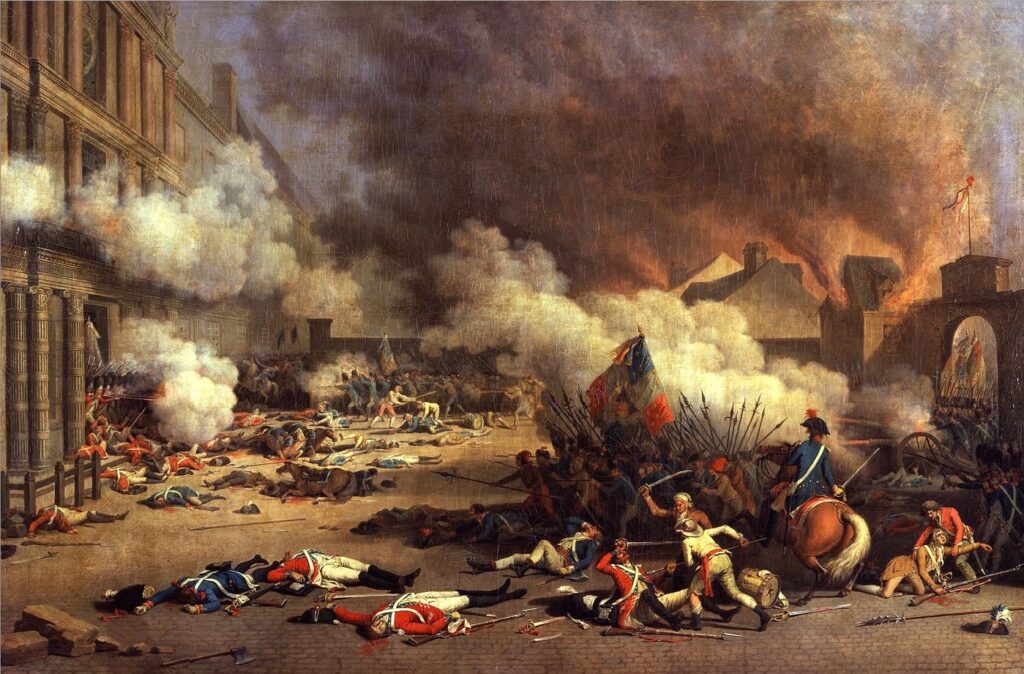
Jacques Bertaux, Prise du Palais des Tuileries, credit Wikipedia
Craftwork
Wollstonecraft: Philosophy, Passion and Politics, Sylvana Tomaselli, Princeton University Press, Princeton & Oxford, 2021, 230pp, pb, reviewed by Leslie Jones
The first riposte to Edmund Burke’s Reflections on the Revolution in France (1790) was Vindications of the Rights of Men (1790), by one Mary Wollstonecraft. Sylvana Tomaselli, a Lecturer in History at St John’s College Cambridge, notes that Wollstonecraft’s thought was profoundly “shaped” by both Burke and Rousseau. [i] She reviewed several of Rousseau’s works and had studied Burke’s A Philosophical Enquiry into the Origin of our Ideas of the Sublime and Beautiful (1757) and his Vindication of Natural Society (1757). Although hardly an original thinker, she was an eloquent writer and a powerful polemicist. Women in contemporary society, she averred, “learn to lisp, to totter in their walk, and nick-name God’s creatures”.
In his Discours sur l’origine et les fondements de l’inégalité (1750), Rousseau maintained that the only inequality in the state of nature was the natural inequality between men, some being stronger and more adroit than others. But, with the establishment of private property and the development of agriculture and industry, the effects of natural inequality were magnified and compounded. Enter inequality of wealth, of social standing and power and all their attendant abuses – to wit, idleness, luxury, poverty, the mutual dependence of the rich and the poor and the selfish wish of the individual to benefit at the expense of others. The upshot was that “Man was born free but is everywhere in chains” (Rousseau, Du Contrat social, 1762).
In similar vein, “dependence” and its multifarious evils was Wollstonecraft’s key idea. The domination of others, in her estimation, whether of one race by another in the case of slavery [ii], of parents over their children, of men over women, of humans over animals, was anathema. She agreed with Rousseau that “the development of the arts and agriculture…led to the sacralization of property” and had “entrenched and accentuated social inequalities”.[iii] Primogeniture, which facilitated the concentration of property within the elite, was her particular bête noire. The passion for wealth and power had temporarily overwhelmed humanity’s natural benevolence. But a rational science of politics could eventually emancipate mankind and lay the foundations of a ‘realistic utopia’, once people realised that “on the general happiness depends their own”.[iv]
The only form of dependence which Wollstonecraft considered acceptable was the creation of society, leading men to “surrender a part of their natural privileges, more effectually to guard the most important”. [v] There are echoes here of Rousseau’s concept of the general will, of the social contract whereby each citizen only obeys himself and remains as free as before. Wollstonecraft condemned dependence on others “for wealth, power, employment, or good opinion”. She believed that dependence had “unmanned” Burke, who received a government pension of £1500 per annum.
In An Historical and Moral View of the Origin and Progress of the French Revolution (1795), Wollstonecraft claimed that “intellectual improvement” had enabled the French people to challenge “the tremendous empire of superstition and hypocrisy…”. The horrors of the Terror, however, severely tested her belief in human perfectibility, ditto her “despair of finding sincerity on earth”. RIP, noble but sometimes deluded soul.
ENDNOTES
[i] Tomaselli, p116
[ii] Wollstonecraft agreed with the Rev. Samuel Stanhope Smith that physical race differences were superficial and attributable to climate. Lord Kames, in contrast, argued that different races had been “naturally fitted for different climates”. Wollstonecraft also disputed the idea that coloured races were inferior and destined for slavery. For her, what divided mankind was “privilege, wealth, legal and political rights, and education” (Tomaselli, p71). God had endowed all human beings with reason and the capacity to cultivate the mind. Moreover, “every human creature has some spark of goodness”. Her main ideas were founded on deism. She “seemed to believe in a Providential order…and wrote within a Creationist perspective”, Tomaselli, p109.
[iii] Ibid p133
[iv] Ibid p131
[v] Ibid p126










